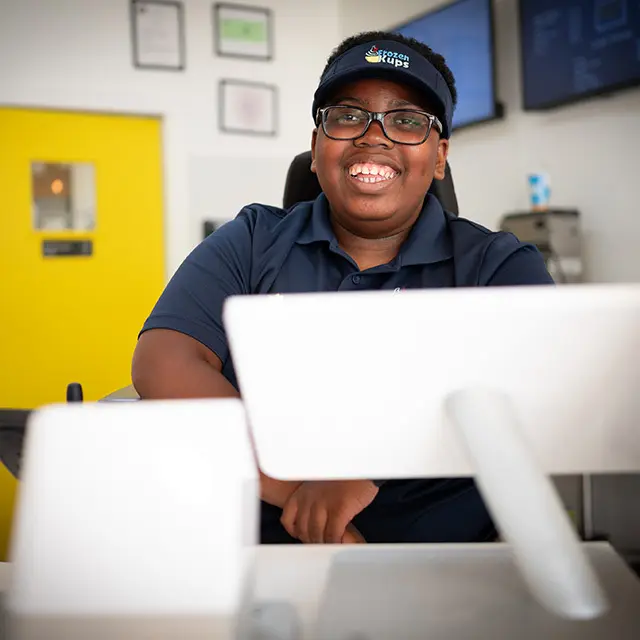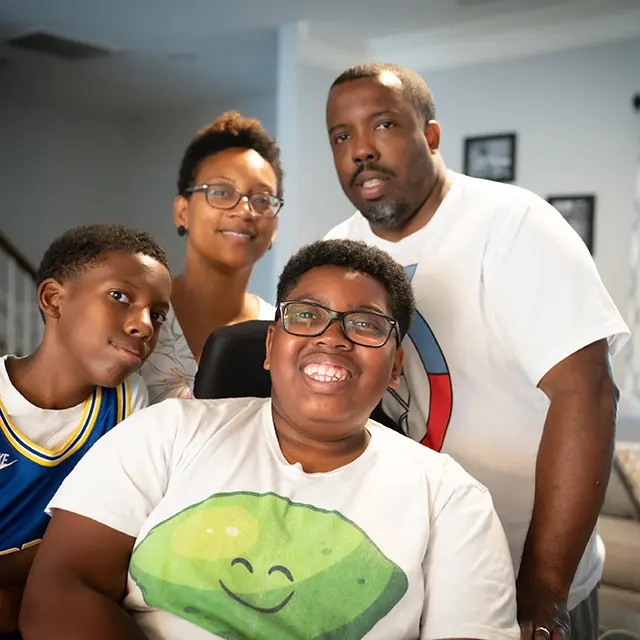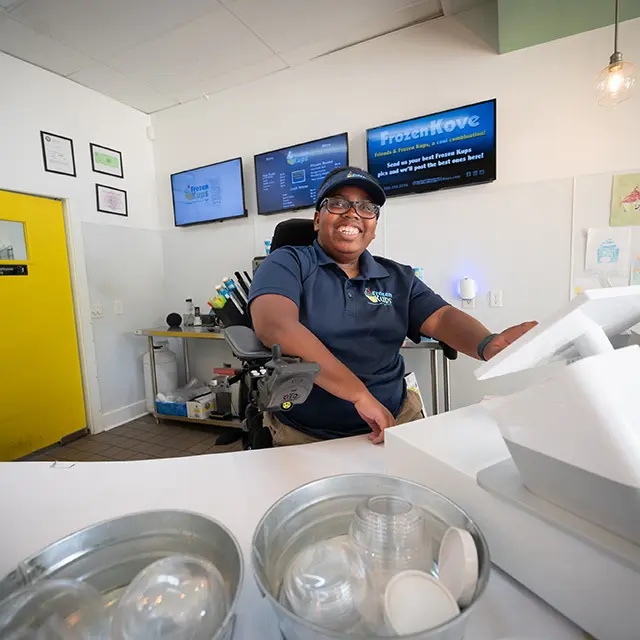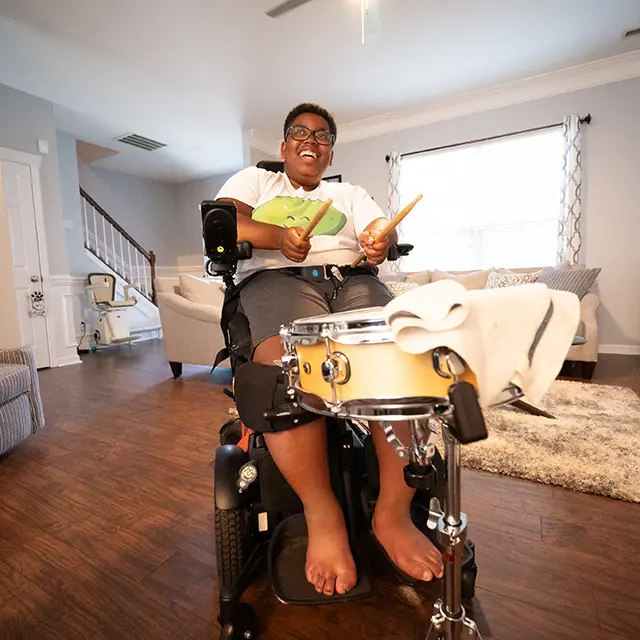Meet Franklin and his Family

Franklin | Living with Duchenne
Franklin, a spirited 14-year-old middle-schooler, leans over his schoolwork as his mother Neekeesha looks on attentively. He has a knack for math and science and a passion for resisting climate change. "I want to work in electrical engineering, on sustainable energy," says Franklin, who has big dreams of transforming the energy grid. Neekeesha lights up when talking about Franklin’s intellectual drive and compassionate heart. "I just want the best for him," she says. "I want him to accomplish his dreams more than anything and I want to be there to see it."
Franklin lives with Duchenne muscular dystrophy (Duchenne), a rare neuromuscular disease that causes progressive muscle weakness. Diagnosed at the age of six, Franklin and his family have adapted to their ever-changing circumstances over the last few years, installing a stairlift in their home to support Franklin’s independent mobility and purchasing a wheelchair accessible family car. His parents work tirelessly to ensure he has the accommodations needed to thrive at 14 years old, as well as advocating for improved treatment options that might benefit Franklin.
Jay and Neekeesha married in 1999 and tried for ten years to start a family. In 2009, at long last, Franklin arrived. Two years later, his brother, Frasier, was born and the family was complete. With two boys so close in age, Jay and Neekeesha naturally observed differences in their development. "There were certain things that Franklin was just doing differently," remembers Neekeesha. He was slow to start walking and fell easily. Eventually, Jay and Neekeesha took Franklin to see a neurologist, who after running many tests over the course of several months, diagnosed Franklin with Duchenne. "That’s when our whole world changed," says Jay. "Almost like it stopped. Standing inside the elevator going to the parking deck. That’s when me and Keesha started to cry. We were crying because we knew he had Duchenne."

"Faith is everything. Without it, I wouldn’t be able to do what I’ve been doing. I chose to take Franklin’s Duchenne diagnosis and turn it into something positive."
—Jay, father

Time to Go to Work
Sorting through the emotional upheaval eventually led to a critical conclusion. "We had to decide whether we were going to have a pity party or go to work," says Jay. So, he dove into research, learning all he could about treating Duchenne, and found hope reading about medicines being developed to slow the progression of the disease. After speaking with Franklin’s doctors and combing through the available treatment options, Franklin’s parents made the decision to enroll him in a clinical trial for a steroid alternative that had the potential to offer similar benefits with fewer side effects. The choice was not made lightly. "We had to decide whether to give our son, our child, over to the hands of the doctors to be given a drug that no human had ever received," Jay recalls.
Franklin received the first dose of an experimental treatment one day before his seventh birthday, when he would have aged out of the trial. He was the first person to ever be treated with the drug. And while it was not expected to reverse the effects of Duchenne, it was designed to slow down the progression of symptoms, providing Franklin and his family with more time for medicine to evolve and new treatments to be investigated.
Despite the therapy he received through the clinical trial, walking became more difficult for Franklin and, at age 13, he transitioned to using a wheelchair full-time. Switching to the power wheelchair has aided in Franklin’s mobility, allowing him to navigate his middle school independently. Franklin has a solid group of friends who enjoy performing together in the middle-school marching band, traveling to compete against other bands in the region each weekend. Franklin’s steadfast supporter and dad, Jay, constantly works to make sure Franklin isn’t faced with inaccessibility issues at the venues, whether it be at a school gymnasium or an open field. "I have to think about the whole school district and find out whether they make accommodations for kids in wheelchairs," he says. "I’m responsible for ensuring every activity is possible for Franklin."
On the weekends, Franklin works part-time at the family’s frozen yogurt shop – instilling in him a newfound sense of independence. "Duchenne is a physical thing," he says. "My muscles are weaker, but that doesn’t mean I can’t do stuff."

Franklin’s Lasting Impact on the Duchenne Community
Franklin’s participation in clinical research has already left a lasting impact on the global Duchenne community. In 2023, the treatment he first received at nearly seven years old was approved for people living with Duchenne, in the US and Europe, as an alternative to traditional steroids. His father, Jay, continues to advocate for advancements in treating Duchenne – citing the family’s strong faith and hope for a future treatment as the driving force that keeps him going. "Faith is everything," says Jay. "Without it, I wouldn’t be able to do what I’ve been doing. I chose to take Franklin’s Duchenne diagnosis and turn it into something positive."
More Stories
At Entrada, we believe that your voice and story are essential. Each individual’s unique experiences help us learn more about unmet needs, enabling us to develop medicines that can have the greatest impact. Meet some of the inspiring families who have shared their stories with us.
Connect With Us
Every Entradan is united in our shared passion for connecting with patient communities. We attend and host meetings in order to listen, learn, and work towards solutions. We’d love to connect with you! Contact Sarah Friedhoff, our Head of Patient Advocacy, at patientadvocacy@entradatx.com.
To learn more about how we honor your privacy, click to see our Privacy Notice








